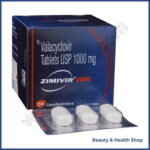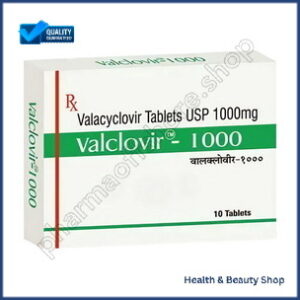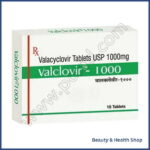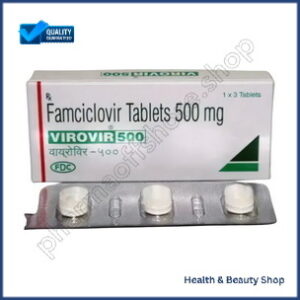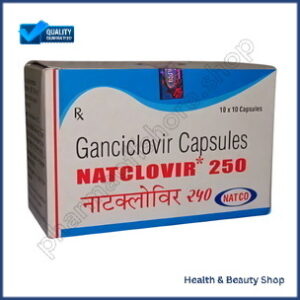ADDICTION
ALCOHOL DEPENDENCE
QUIT SMOKING
ALLERGY
ANTI FUNGAL
FUNGAL INFECTION
FUNGAL NAIL INFECTIONS
ANTI-REJECTION DRUGS
ANTI WORM
ANTIBIOTIC
BACTERIAL INFECTIONS
ARTHRITIS
GOUT
OSTEOARTHRITIS
RHEUMATOID ARTHRITIS
BLOOD
LOW PLATELET COUNT
THROMBOPHLEBITIS
VARICOSE VEINS
COLON
ANAL FISSURE
PILES
ULCERATIVE COLITIS
DIABETES CARE
DIABETES INSIPIDUS
DIABETES TYPE
DIABETIC FOOT ULCERS
GLUCOSE MONITOR
EYES/EAR CARE
DRY EYES
EYE CARE
EYE EXAMINATION
EYE INFECTION
EYE LASHES
EYE PAIN
GLAUCOMA
OCULAR HYPERTENSION
UVEITIS
FEVER CARE
MALARIA
RHEUMATIC FEVER
TYPHOID FEVER
GASTROINTESTINAL
ACIDITY
CONSTIPATION
CROHN'S DISEASE
DIARRHOEA
GALLBLADDER STONES
INTESTINAL ULCERS
IRRITABLE BOWEL SYNDROME
MOTION SICKNESS
NAUSEA
Zimivir (Valacyclovir)
Zimivir 1000 mg (Valacyclovir)
| Active Ingredient (Generic Name): | Valacyclovir |
|---|---|
| Indication: | Herpes labialis, Genital herpes infection, Herpes zoster |
| Manufacturer | GlaxoSmithKline Pharmaceuticals Ltd |
| Packaging: | 3 tablets in one strip |
From: $83.00
You have been prescribed Zimivir, which contains valacyclovir, a medication that converts to acyclovir, an effective antiviral drug. This medication is used to treat and manage herpes simplex infections by inhibiting viral DNA replication in infected cells. It helps reduce the severity, frequency, and symptoms of cold sores and genital herpes, and is also used for suppressive therapy. Follow the dosage instructions provided, complete the full treatment course, and remember to stay hydrated. Possible side effects such as nausea, headache, and diarrhea may occur, but they are typically mild and temporary. As you progress with your treatment, you will receive more information on potential interactions, precautions, and storage guidelines to ensure safe and effective use.
Main Points
Valacyclovir, also known as Zimivir, is an antiviral drug prescribed for treating herpes simplex infections. It reduces the severity and frequency of outbreaks by converting to acyclovir, which targets viral DNA replication within infected cells. Dosage is individualized based on the medical condition and response, and it is important to complete the full treatment regimen. Common side effects are generally mild and transient, but it is important to be vigilant for allergic reactions, kidney issues, and potential low blood cell count. Prior to use, inform your healthcare provider about all current medications and supplements, and seek medical advice if considering use during pregnancy or breastfeeding.
How Zimivir Works in Body
When Zimivir is ingested, valacyclovir quickly changes into acyclovir, an antiviral drug that acts against viral DNA replication. This transformation is facilitated by the enzyme valacyclovir hydrolase present in the body. Acyclovir is then converted into its active state, acyclovir triphosphate, which integrates into the viral DNA, hindering the virus from reproducing.
Acyclovir triphosphate accumulates in the infected cells, specifically targeting the viral DNA while preserving the host cell’s DNA. This precise targeting allows for effective antiviral action with minimal side effects. Acyclovir has an elimination half-life of about 2.5-3.3 hours and is primarily excreted through the kidneys. The rapid conversion of valacyclovir into acyclovir enables Zimivir to deliver potent antiviral treatment for various viral infections.
Uses and Indications for Treatment
Zimivir is commonly prescribed to treat various viral infections, with a primary focus on herpes simplex infections such as cold sores or genital herpes. It is also effective in treating other viral infections. Further details on Zimivir’s indications for treatment will be discussed in the following sections.
Herpes Simplex Infections
Valacyclovir, sold under the brand name Zimivir, is indicated for treating herpes simplex infections such as cold sores and genital herpes caused by the herpes simplex virus (HSV). HSV-1 commonly causes cold sores around the mouth, while HSV-2 typically leads to genital herpes.
Taking Zimivir helps reduce outbreak severity, frequency, and symptoms like itching, burning, and tingling. Prompt treatment within 24-48 hours of symptoms is crucial for optimal results. Zimivir can accelerate healing, lower transmission risk, and prevent complications. It may also be prescribed for suppressive therapy to prevent or reduce future outbreaks.
Viral Infections Treatment
Following your doctor’s guidance is essential for the effective use of Zimivir in treating viral infections like cytomegalovirus (CMV) retinitis in immunocompromised patients, herpes zoster (shingles), and herpes simplex infections. Zimivir is effective against a range of viral infections affecting different body areas.
- Viral Infection: Affected Area: Treatment Outcome:
- Herpes Zoster (Shingles): Skin: Reduces pain, duration, and severity.
- Cytomegalovirus (CMV) Retinitis: Eyes: Prevents blindness in immunocompromised individuals.
- Herpes Simplex: Skin, Genitals: Reduces severity, frequency, and duration of outbreaks.
Zimivir is a versatile medication for various viral infections. Adhering to your doctor’s instructions can help decrease infection severity and duration, potentially avoiding complications. It is crucial to follow your doctor’s advice and complete the treatment regimen for optimal results.
Dosage and Administration Guidelines
Dosage and administration guidelines for Zimivir are tailored to your specific medical condition and treatment response. The recommended dosage varies based on the type of viral infection and your individual health needs.
For herpes simplex virus (HSV) infections, the typical dosage ranges from 500 mg to 1 gram taken twice daily for 7 to 10 days. Recurrent episodes may require 500 mg twice daily for 3 to 5 days.
For herpes zoster (shingles), the usual dosage is 1 gram taken three times daily for 7 days. In HIV-infected adults, the recommended dosage is 500 mg twice daily.
To achieve optimal results, follow your doctor’s instructions precisely and complete the full treatment course. Stay well-hydrated during treatment. If you miss a dose, take it as soon as you remember unless it is almost time for the next scheduled dose.
Possible Side Effects and Warnings
When starting Zimivir, it’s important to be aware of the potential side effects and warnings linked to this medication. You may experience common side effects like nausea, headaches, or dizziness, which are usually mild and short-lived. However, it’s crucial to watch out for severe warning signs that require immediate medical attention, as discussed in the following sections.
Common Side Effects
Valacyclovir, found in Zimivir, may lead to common side effects such as nausea, headache, and dizziness. These effects are typically mild and temporary, resolving as the body adjusts to the medication. It is essential to be informed about these potential reactions.
- Nausea: Common (up to 19%) – Mild to moderate stomach discomfort
- Headache: Common (up to 14%) – Mild to moderate pain or discomfort
- Dizziness: Common (up to 8%) – Mild to moderate lightheadedness
- Fatigue: Uncommon (up to 4%) – Mild to moderate feeling of tiredness
- Diarrhea: Rare (less than 1%) – Loose, watery stools or frequent bowel movements
While you may experience some or all of these side effects, they are typically not severe. If you have concerns or if the side effects persist, it is advisable to consult your healthcare provider. Remember to consider the benefits of using Zimivir in relation to the potential side effects.
Serious Warnings Signs
In rare cases, Zimivir may lead to serious side effects that require immediate medical attention. If you experience any of the following symptoms, seek medical help right away.
Watch out for signs of an allergic reaction, such as difficulty breathing, swelling of the face, lips, tongue, or throat, or a rash. Zimivir may also cause blood-related issues like low platelet count (thrombocytopenia) or low white blood cell count (neutropenia), resulting in easy bruising, unusual bleeding, or frequent infections.
Moreover, Zimivir can potentially trigger kidney problems, which may present as changes in urination habits, swelling in the hands and feet, or fatigue. In rare instances, Zimivir may lead to a severe condition known as thrombotic thrombocytopenic purpura (TTP), characterized by fever, bruising, and kidney failure. Consult your doctor promptly if you notice any unusual symptoms to prevent serious complications.
Interactions With Other Medications
Zimivir may interact with certain medications, affecting their effectiveness or increasing the risk of side effects. Inform your doctor about all current medications to prevent potential interactions.
Interactions may occur with the following medications:
- Probenecid: Increases Zimivir concentrations, possibly leading to more side effects
- Cimetidine: Raises Zimivir concentrations, potentially causing increased side effects
- Cyclosporine: Could elevate the risk of kidney damage when combined with Zimivir
- Digoxin: May heighten the risk of digoxin toxicity when taken with Zimivir
- Theophylline: Might increase the risk of theophylline toxicity when used alongside Zimivir
Discuss your medication regimen with your doctor to ensure safe treatment. Dosage adjustments or close monitoring may be necessary to manage potential interactions.
Precautions and Contraindications
When using Zimivir, caution is necessary due to potential interactions and effects on certain medical conditions. It is crucial to inform your healthcare provider about any existing kidney or liver issues for possible dosage adjustments. Disclose all current medications, including supplements, to prevent adverse reactions.
- Kidney disease: Monitoring is essential as Zimivir can impact kidney function.
- Pregnancy and breastfeeding: Consult a healthcare provider before using Zimivir as its safety during pregnancy and breastfeeding is not fully established.
- Hypersensitivity: Avoid Zimivir if allergic to valacyclovir or acyclovir.
- Elderly patients: Consider lower doses for older individuals due to age-related kidney changes.
- Immunocompromised patients: Zimivir may be less effective in those with severely weakened immune systems.
Storage and Disposal Instructions
Proper storage of Zimivir tablets is essential for maintaining their effectiveness. Store them in a cool, dry place, away from direct sunlight and moisture. Keep the tablets in their original packaging or a tightly closed container to protect them from air, light, and humidity. When traveling, pack your Zimivir tablets in a carry-on bag to control storage conditions. Follow the disposal instructions provided by your pharmacist or local authorities for unused or expired tablets. Avoid flushing them down the toilet or throwing them in the trash to prevent environmental harm. Take them to a designated drug take-back program or community collection center for proper disposal. Adhering to these guidelines ensures the safe and effective use of Zimivir.
Frequently Asked Questions
Can I Crush or Split Zimivir Tablets to Make Them Easier to Swallow?
It is essential to proceed with caution if you are having difficulty swallowing tablets and considering crushing or splitting them. Altering Zimivir tablets by crushing or splitting them can impact the medication’s release mechanism, potentially affecting its absorption and effectiveness. It is always recommended to seek advice from your healthcare provider or pharmacist before making any changes to your medication regimen. Consult with your healthcare provider to determine the best course of action for your specific situation regarding crushing or splitting Zimivir tablets.
Is Zimivir Safe to Use During Pregnancy or Breastfeeding?
When considering medication during pregnancy or breastfeeding, it is important to prioritize safety. Antiviral medications like Zimivir should be used cautiously during these times. They may be prescribed to treat severe infections, but the benefits must outweigh the risks. It is recommended to consult with your doctor to assess your individual situation and receive guidance on the best course of action. Always inform your healthcare provider about your pregnancy or breastfeeding status to ensure an informed decision is made.
How Long Does It Take for Zimivir to Start Working in the Body?
When taking Zimivir, the antiviral medication typically starts working within 2-3 days, but improvement may take up to a week to become noticeable. The effectiveness of Zimivir in alleviating symptoms and reducing infection severity varies depending on individual response and the type of infection.
Can I Take Zimivir With Food or Should It Be Taken on an Empty Stomach?
When taking Zimivir, it is advisable to follow the specific instructions provided by your doctor or the medication label. Generally, it can be taken with a full glass of water, with or without food. However, to reduce the risk of stomach upset, taking it with a meal may be beneficial. It is essential to adhere to the guidelines given to you regarding the administration of Zimivir.
Will Zimivir Interact With My Birth Control Pills or Hormone Replacement Therapy?
If you are taking birth control pills or hormone replacement therapy (HRT) along with your medication, such as Zimivir, there is usually no significant interaction between them. It is advisable to inform your healthcare provider about all the medications you are currently taking, including your birth control and HRT, so they can evaluate any potential interactions and make any necessary adjustments to your treatment plan.
Conclusion
You have been prescribed zimivir, a medication commonly used to treat herpes simplex, shingles, and chickenpox. Understanding how zimivir functions, its recommended dosage, possible side effects, and storage requirements is essential for effective treatment. Adhering strictly to the dosage instructions, being cautious of potential drug interactions, and storing the medication correctly are crucial. By following these guidelines, you can effectively manage your condition and take charge of your health.



